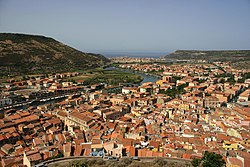Bosa
| Bosa | ||
|---|---|---|
| Comune | ||
| Comune di Bosa | ||

view of Bosa from the Serravalle's Castle
|
||
|
||
| Location of Bosa in Sardinia | ||
| Coordinates: 40°18′N 8°30′E / 40.300°N 8.500°E | ||
| Country | Italy | |
| Region | Sardinia | |
| Province / Metropolitan city | Oristano (OR) | |
| Frazioni | Bosa Marina | |
| Government | ||
| • Mayor | Luigi Mastino | |
| Area | ||
| • Total | 135.67 km2 (52.38 sq mi) | |
| Elevation | 5 m (16 ft) | |
| Population (1 January 2009) | ||
| • Total | 8,126 | |
| • Density | 60/km2 (160/sq mi) | |
| Demonym(s) | Bosani Bosincos |
|
| Time zone | CET (UTC+1) | |
| • Summer (DST) | CEST (UTC+2) | |
| Postal code | 08013 | |
| Patron saint | St. Emilius and Priamus | |
| Saint day | May 28 | |
| Website | Official website | |
Bosa is a town and comune in the province of Oristano (until May 2005 it was in the province of Nuoro), part of the Sardinia region of Italy. Bosa is situated about two-thirds of the way up the west coast of Sardinia, on a small hill, about 3 kilometres (2 miles) inland on the north bank of the Temo River. The town has maintained a population of around 8,000 people for a significant amount of time, but has an urban character that has differentiated it from other locations in Sardinia. Agriculture and fishing play an important part in the city economy, thanks to the river valley near the coast surrounded by hills and highland plateaus.
The area was inhabited since prehistorical times, as attested by the presence of several domus de janas and nuraghe. It was probably founded by the Phoenicians, although little is known about the original settlement. Under the Romans it was a municipium. The present town of Bosa was founded in 1112 by the Malaspina, 2½ km (1½ miles) from the site of the ancient town (Bosa or Calmedia) In the early Middle Ages, as part of the Giudicato of Logudoro, it was a provincial capital. After the construction of the Malaspina Castle, the population gradually moved from the seaside to the hills.
It remained in the hands of the Malaspina family until the 14th century when it was taken over by the House of Aragon. Along with the rest of Sardinia, it was later ruled by Spain via royal marriage. For a short period in between it was a part of the independent Kingdom of Arborea (Giudicato of Arborea).
...
Wikipedia


